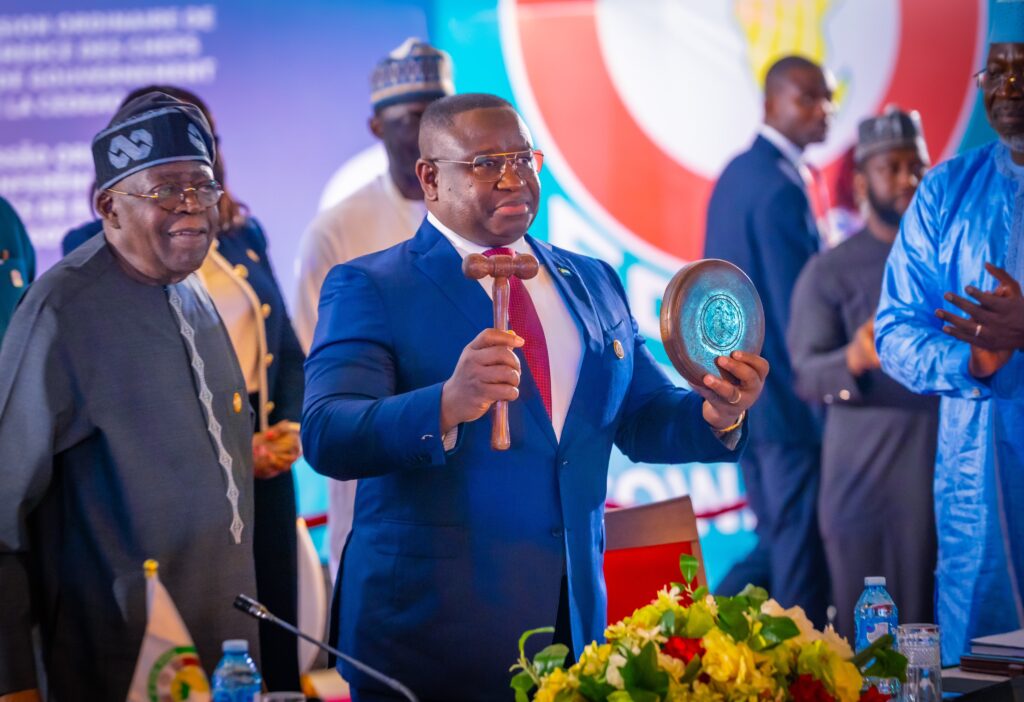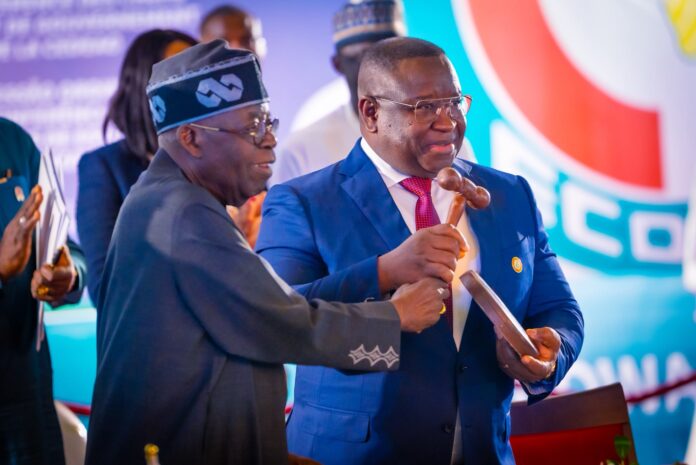ABUJA, Nigeria, June 22, 2025 — President Bola Ahmed Tinubu of Nigeria on Sunday formally handed over the leadership of the Economic Community of West African States (ECOWAS) Authority of Heads of State and Government to President Julius Maada Bio of Sierra Leone, marking the end of his two-term tenure as Chairman.
The symbolic handover took place in Abuja during the closing ceremony of the 67th Ordinary Session of the ECOWAS Authority. The event was highlighted by the ceremonial transfer of the ECOWAS Emblem to President Bio, signifying a new phase of regional leadership.
In his farewell address, President Tinubu described it as a “profound honour and privilege” to have led the sub-regional body, expressing his gratitude for the trust and support of member states.
“As I now hand over the mantle of leadership to my great friend and dear brother, His Excellency President Julius Maada Bio of Sierra Leone, the new Chairman of the ECOWAS Authority of Heads of State and Government, I do so with a deep sense of fulfilment and optimism for the future of West Africa,” President Tinubu said.
He praised the resilience of the region in the face of political and security challenges and called on leaders to remain steadfast in addressing the evolving needs of West African citizens.
“Let us deepen cooperation, uphold diplomatic principles, and foster inclusive growth that leaves no one behind—especially our youth, women, and vulnerable populations, who remain central to the future of our region,” Tinubu urged.
The outgoing Chairman also stressed the inseparable link between democratic stability and economic development.
“Economic integration cannot be superimposed on an untenable political environment. That is why we must remain steadfast in our resolve to rise to these emerging challenges,” he said.
President Tinubu commended the ECOWAS Commission, community institutions, and technical staff for their professionalism and commitment in facilitating a successful summit. He reaffirmed his continued dedication to the ECOWAS vision of peace, unity, and economic integration.
“As you return to your respective countries, let us remain resolute in our shared mission to deepen our integration, protect our people, and build a prosperous, secure, and united West Africa,” Tinubu concluded.
President Bio Sets Vision for “People-Centered and Action-Oriented ECOWAS”

In his acceptance speech, President Julius Maada Bio of Sierra Leone laid out an ambitious vision for his tenure, pledging to drive a people-focused, proactive ECOWAS agenda.
He outlined four major priorities:
- Restoring constitutional order and deepening democracy,
- Revitalising regional security cooperation,
- Unlocking economic integration, and
- Building institutional credibility.
“We must engage transitional governments constructively and support member states in building stronger democratic institutions rooted in the rule of law,” President Bio stated.
Highlighting the growing threat of terrorism, political instability, and transnational crime in the region—especially in the Sahel and coastal states—President Bio stressed the urgent need for overhauling ECOWAS’ collective security architecture.
“From intelligence sharing to rapid response capabilities, we must confront new threats with unity and resolve,” he declared.
He also emphasized the importance of transforming regional trade frameworks into engines of growth and opportunity.
“The ECOWAS Trade Liberalisation Scheme, regional infrastructure, and cross-border value chains must become engines of job creation, trade, and resilience, especially for our women and youth.”
President Bio called for internal reforms within ECOWAS to rebuild public trust and ensure transparency, efficiency, and responsiveness to the needs of West Africans.
“ECOWAS must reform itself. This is how we will rebuild trust in regional cooperation,” he added.
The new chairman praised President Tinubu for his “experience and leadership” during his tenure and vowed to build on the foundation of regional dialogue, peacebuilding, and economic recovery that his predecessor established.
Acknowledging the challenges ahead, President Bio noted that West Africa stands at a critical juncture.
“The democratic space is under strain in parts of our region. In some countries, the constitutional order has been disrupted. Yet, across West Africa, citizens—especially our youth—are demanding not just elections, but also accountability, transparency, and a fair stake in national life,” he said.
The session closed with renewed calls for unity, cooperation, and bold leadership as ECOWAS confronts a rapidly evolving regional landscape.
ECOWAS at a Glance
Founded in 1975, the Economic Community of West African States (ECOWAS) is a regional political and economic union of 15 countries. Its primary goal is to promote economic integration, peace, and stability among member states.



